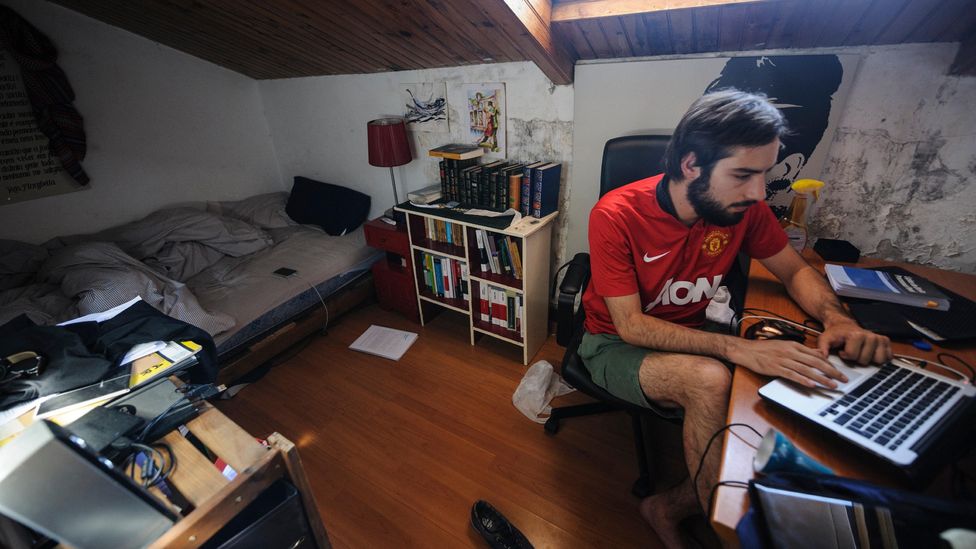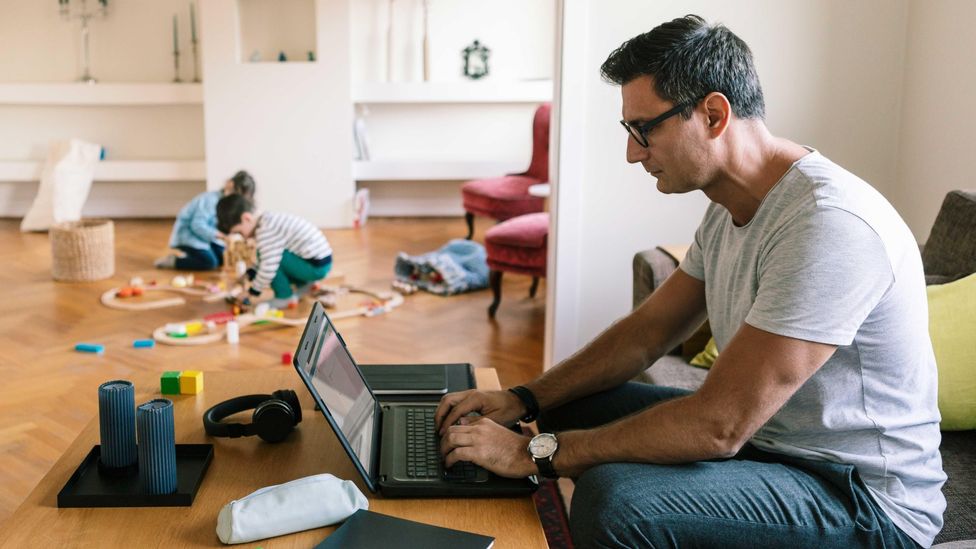Before the pandemic, Gail Cornwall talked mostly about other people’s children, not her own. Cornwall, 40, writes about parenting and education, and always did the majority of her work while her kids were at school. But the pandemic meant all the kids in her blended family – five children between the ages of six and 17 – were suddenly spending all their time at home.
“Only two are back in school even part time now,” says Cornwall, who lives in San Francisco. These days, she finds herself talking about them a lot. She often begins work calls by explaining that she has a house full of kids and that she might get interrupted. “It just feels more professional to have that be anticipated than to just be interrupted out of the blue.”
The pace of her work has changed, too. “When it comes to setting deadlines, I’ve certainly had to pad them more, give myself a longer runway,” she says. “I’ve said things like, ‘I can probably turn this around in two weeks. But let's say four, just in case, since I have so many kids in the house right now and things come up’.”
Over the last year, many of us have found ourselves wrestling with the unfamiliar need to discuss personal responsibilities while handling professional ones. Before the pandemic, workers had no real obligation to share anything about their lives with their bosses. At larger organisations, HR departments might have known little more than employees’ names, addresses and birthdays. But once Covid-19 abruptly shifted work into our homes, we suddenly had to share more with employers, because our private lives were playing out during working hours.
Some of this has been positive; there’s a sense that giving employers more insight into our home circumstances, responsibilities and even health could result in greater accommodation. But there are also questions about how much we want to share with our employers, and what feels like a breach of privacy – as well as how companies will use the information they learn.
Intrusion or necessary details?
In August, the Forward Institute, a UK-based non-profit group, released a report examining how organisations had responded to Covid-19, including an assessment of what it called the “fundamental shift in what employers know, and need to know, about their employees’ personal circumstances”.

Workers may feel uncomfortable sharing their living circumstances with their employers, for all kinds of reasons (Credit: Alamy)
Through interviews with leaders at a number of major organisations, researchers found none of them “knew their staff’s home-working conditions… prior to the crisis”. After all, they note, before homes became workplaces, “widespread enquiries from employers about home and family circumstances would have been regarded as an unwarranted intrusion into employees’ private lives”.
But such enquiries – and policy changes based on the information they elicited – became important when the pandemic hit, says Ruth Turner, senior director at the Forward Institute, as companies found themselves reckoning with a new duty of care to their employees. “As soon as schools shut down, people’s children started appearing on their laps in their Zoom calls. Elderly relatives people live with and care for were present in the background,” she says. Many employers reacted by increasing flexibility, she adds, understanding that employees who are also parents and carers were juggling outsized burdens.
For some people, the simple act of appearing on video has been revealing. Before the rise of remote work, a living situation like staying in a parent’s basement because of divorce or crippling debt, or sharing a tiny flat with three other adults, for instance, wasn’t something an employer needed to know about.
Now, it’s become necessary to share at least bits and pieces, not only to provide context for the background of Zoom calls, but because employers may have a duty to help make that living situation more conducive to work. A recent study of more than 30,000 global workers showed that more than 40% lack essential office supplies at home, and one in 10 don’t have the internet connection they need to adequately do their job. As employers work out whether teams will be able to keep working remotely, they’ll also have to determine the company’s obligation to solve these problems.
“If we are moving into this hybrid world where people have to, or choose to, do their work at home, who pays for the Wi-Fi connection?” says Turner. “If somebody can only sit on the side of their bed, does that mean they’re not allowed to work there,” because they can’t make their home working situation compatible with the company’s health and safety policy? “These are all interesting questions that nobody has the answers to yet.”
‘Will they treat me differently?’
Beyond speaking about caring responsibilities or household circumstances, some people had to disclose health issues they’d previously kept private.
“Immediately, people felt they had to declare their long-term conditions and disabilities, because it put them in a risk category,” says Turner. “You might have a condition that there was no need to tell your employer about before, but that suddenly made you much, much more vulnerable to Covid. All of these things in the private domain suddenly became public.”

Disclosing a health condition to bosses can feel risky to some workers, experts say (Credit: Alamy)
People who have disabilities or health conditions and injuries make up 10% of the global workforce, says Brendan Roach, director of strategy and “networkology” at PurpleSpace, a London-based professional-development resource network for disabled employees. But because the issues aren’t obvious, employers can have no idea they have employees with disabilities. “Many have disabilities that aren’t visible or aren’t immediately apparent, like dyslexia, anxiety – even diabetes,” says Roach. “What the pandemic has done is shifted what your employer needs to know about your health. In a way, that’s very good – it normalises conversations about health and work.”
But, adds Roach, there are also valid reasons people with invisible disabilities chose not to disclose that information pre-pandemic. “There’s a degree of fear. If I tell my employer I have this condition, will they treat me differently, or will it hold me back? That’s something that plays out for people with disabilities at work.”
‘Fundamental trust issue’
Historically, many employees have opted to keep their heads down at work, and their employer’s nose out of their personal business. Some of this is due to simple privacy concerns, but for many, this choice stems from real fear that the more an employer knows, the more vulnerable they may be as workers.
For instance, before the pandemic, many parents in corporate environments practiced “secret parenting” to avoid the stigma of seeming incapable, unfocused or lacking in commitment. It’s not an imagined risk: between 2006 and 2015, cases of workplace discrimination because of family responsibilities in the US more than tripled.

Some work cultures have traditionally been intolerant of workers' external responsibilities – making people reluctant to discuss them (Credit: Alamy)
The pandemic may have forced information about family responsibilities and home environments – and, for that matter, chronic health conditions and disabilities – out into the open. But that doesn’t mean the reasons for not wanting to share that information before have gone away.
Turner says that responsibility falls to the employer to make sure none of the fears about discrimination or career obstruction come to pass, and that the information is being used responsibly. “It’s a fundamental issue of underlying trust,” she says. “If you feel your employer has your interests at heart, or strikes a balance between your needs and the organisation’s, you’re likely to be more comfortable with them knowing about your disability or health concerns.”
Even organisations with a high degree of trust between leadership and employees “can’t just trade on it”, says Turner. “Individuals have a legitimate expectation that if they disclose something they ordinarily would’ve kept private, it will be kept confidential. Data-privacy issues come to the fore; workers need to know why they’re being asked, who will have access to the information, and what the company will do with it.”
Roach takes an optimistic view, believing a cultural shift toward making jobs work for the people in them, as opposed to the other way around, is beginning with bosses getting more personal. “Leaders have become more human in the last year,” he says. “People are seeing them in their living rooms, in their tracksuits.”
In turn, some of those more humanised leaders are moving toward building work environments that recognise their employees’ individual needs, creating spaces where the personal and professional can overlap.
And if the lasting effect of the abrupt need to be more open with our employers is more flexible workplaces that can do more to accommodate the responsibilities, challenges and complications that are part of our lives, perhaps workers will consider that sacrificing a bit of privacy is worth the risk.
"about" - Google News
April 20, 2021 at 03:00AM
https://ift.tt/3x5Hk6K
Employers know more about our lives than ever – now what? - BBC News
"about" - Google News
https://ift.tt/2MjBJUT
Bagikan Berita Ini














0 Response to "Employers know more about our lives than ever – now what? - BBC News"
Post a Comment